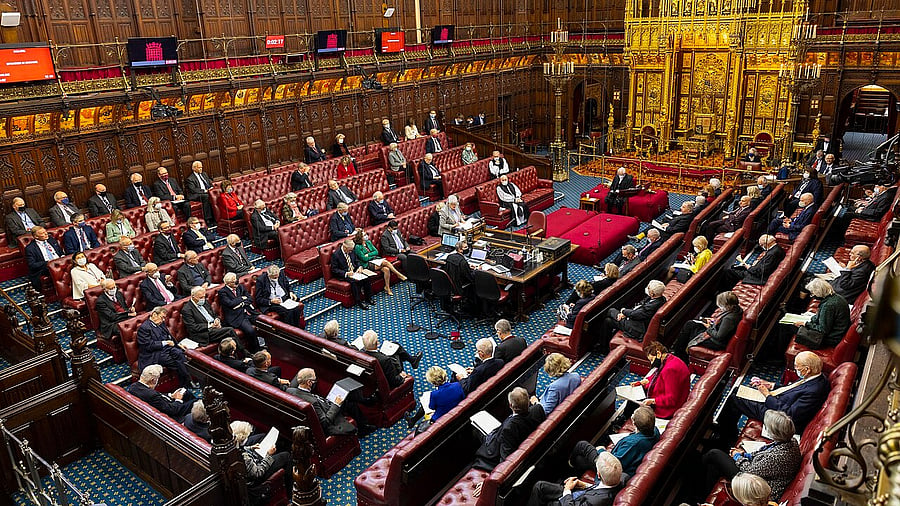
House of the lords
Credit: Wikimedia commons/By ukhouseoflords
By Rosa Prince
“The House of Lords is indefensible.” So said Keir Starmer in December 2022, endorsing proposals drawn up by his predecessor as Labour prime minister, Gordon Brown, to update UK’s ancient legislature.
In many ways, it was a statement of the obvious, echoing the avowed policy of governments dating back more than a century.
Those opposing the latest plan to finally kick out the last hereditary peers, which is being debated in the Lords, certainly attest with apparent sincerity that having an ancestor who slept with a medieval king or provided men for a crusade 800 years ago shouldn’t be a ticket to Parliament.
And yet they continue to filibuster, obstruct and delay the legislation, just as their fathers and forefathers (there have been vanishingly few foremothers) did before them.
The pace of enacting the overwhelmingly popular and long overdue step to abolish hereditary peers should be accelerated — and followed up with the prompt introduction of a modern legislature befitting a grown-up democracy.
Overhauling Parliament’s upper chamber, which now has 833 members, has for too long run aground on the sandbank of conflicting and contradictory aims among the critics.
British politicians look across the water at second chambers from the US to Germany, Australia and Canada and fail to see a legislature that suits their purposes. And so because they can’t agree, they do nothing, and stumble on with a parliament that’s the worst of all worlds; a classic case of the perfect being the enemy of the good.
The last major reform of the Lords took place under Tony Blair’s government in 1999. He got rid of most of the hereditary peers, but under a shameful compromise, agreed that 92 could stay, on the tacit understanding that, in return, the Conservative-dominated Lords wouldn’t block his Labour government’s legislative program. The hereditary principle has remained in the Lords ever since, with dying aristocrats replaced from time to time by slightly younger aristocrats in what must be the strangest elections in the world — a vote among the fellow hereditary peers, usually from the same party.
This bizarre system was always intended to be temporary, but as the years rolled by and governments came and went, politicians in both houses of Parliament repeatedly rejected all proposals for what a new-look House of Lords should be.
On one infamous occasion in 2003, the House of Commons was offered seven options, from a fully appointed to a fully elected chamber, only to reject them all. The Lords overwhelmingly plumped for a fully elected chamber, but without the backing of their MP colleagues, the plan fell.
When the going on Lords reform got tough, governments of all parties vacated the field. There are always more pressing matters. Despite his warm words to Brown three years ago, Starmer himself is also now guilty of kicking the Lords can down the road, limiting his reforms to the expulsion of the hereditaries. Labour’s 66-year-old leader in the Lords, Angela Smith, promised measures to introduce an age restriction of 80 (in a house in which the average age is 70) and attendance requirements (on average fewer than half their lordships turned up each day in the last parliament) if consensus could be achieved — cue hollow laughs. The Lords’ youngest peer has urged the government to “abolish it — me included.”
Meanwhile, Labour’s manifesto promise to consult on fundamental reform shows no visible sign of life — when the party came into office last July, the briefing was that this was very much parked for a second term.
That’s a mistake. At a time when young people are switched off by politics, populists are on the rise and the sense grows that elites are out of touch, what better and more pressing matter could there be than reestablishing faith in democracy?
There’s no shortage of ideas for the form a new chamber could take.
The consensus is that the new chamber shouldn’t be imbued with so much electoral legitimacy that it challenges the supremacy of the House of Commons; but it’s also not ideal that, as is mostly now the case, appointments are the sole prerogative of the prime minister. Their lordships should probably be more reflective of the nation they serve, on the lines of gender, race, religion and geography. How to achieve that is the question.
Brown himself proposed an “elected assembly of the nations and regions,” which would share elements of the German Bundesrat. The Lords could be elected by proportional representation as in Australia, sit for longer terms than MPs in the lower house and use rolling elections, as in the US Senate, or be replaced by by-elections when they die or retire, as in Canada. One fun idea I have heard is for the upper chamber to be based on employment, formed from trade union and professional bodies. There could also be a role for beefing up HOLAC — the Lords’ Appointments Commission — which currently nominates non-political greats and goods to the cross benches.
Given Parliament’s failure to do anything of substance on Lords reform, responsibility for choosing a new system could be handed over to citizens’ juries, as has happened in the Republic of Ireland and elsewhere when considering major constitutional change, and confirmed in a referendum. This would have the added bonus of making sure the electorate is invested in the new upper house.
Britain’s Parliament dates back to the Saxon era — that is, before William the Conqueror arrived from Normandy in 1066 — when it was known as the “Witenagemot,” the assembly of “wise men” who advised the king, and became known as the “mother of parliaments” as it helped spread democracy around the world. Right now, though, the House of Lords doesn’t look very wise or democratic. Starmer should grab this opportunity to forge a new relationship between the governed and those who govern as a priority not an afterthought for the sometime-never.